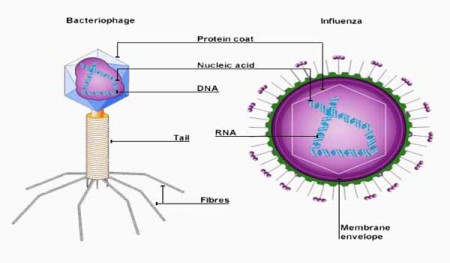Viruses infect all types of life forms from animals and plants to microorganisms including bacteria and archaea. Anatomically viruses possess nucleic acids dna or rna which are encased within a protective protein coat.
Major Differences Difference Between Virus And Viroid
These entities are able to infect all forms of life ranging from bacteria to humans and consequently they bring about a multitude of diseases in their host.

Virus definition biology simple. A virus invades living cells and uses their chemical machinery to keep itself alive and to replicate itself. It can make copies of itself inside another organism s cells. Virus definition a virus is a chain of nucleic acids dna or rna which lives in a host cell uses parts of the cellular machinery to reproduce and releases the replicated nucleic acid chains to infect more cells.
A virus is a submicroscopic infectious agent that replicates only inside the living cells of an organism. Viruses consist of nucleic acid and a protein coat. Viruses are able to cause many types of diseases such as polio ebola and hepatitis.
Viruses infect cells of microorganisms plants and animals and whilst they carry out no metabolism themselves they are able to control the metabolism of the infected cell. A true virus cannot spread to another computer without human assistance. Virus infectious agent of small size and simple composition that can multiply only in living cells of animals plants or bacteria.
Viruses are ultra microscopic non cellular living particles composed solely of a nucleic acid dna or rna core surrounded by a protein envelope called capsid. Usually the nucleic acid is rna. In infection the virus interacts with the host cell surface and penetrates the cell.
The name is from a latin word meaning slimy liquid or poison. Virus a software program capable of reproducing itself and usually capable of causing great harm to files or other programs on the same computer. A virus is a microscopic parasite that can infect living organisms and cause disease.
Sometimes it is dna. A virus is a biological entity that can only reproduce within a host. A microorganism that is smaller than a bacterium that cannot grow or reproduce apart from a living cell.
Virus nucleic acid is replicated and virus components are synthesized inside the cell.
Pathogens Bacteria Viruses Fungi Gcse Biology Revision
Definition Of Virus In Botany Qs Study
Gk Questions And Answers On Types Of Viruses Biology
What Are Viruses Discover The Classification And Properties Of Viruses
Viruses Biology Library Science Khan Academy
Virus Definition Structure Classification Examples Biology Dictionary
Viruses General Characteristics Of Viruses Sparknotes
8 Introduction To Viruses Biology Libretexts
Virus Kids Britannica Kids Homework Help
Viruses Introduction British Society For Immunology
Virus Infections And Hosts Boundless Biology

0 comments:
Post a Comment